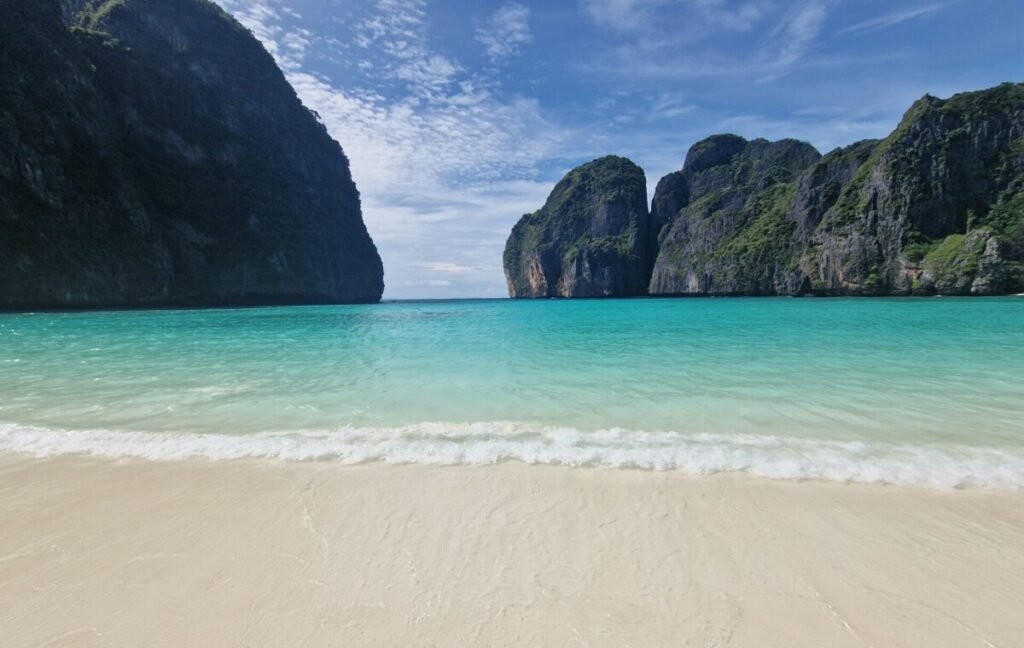
Digital Nomads – 5 Best Places in Malaysia
The 5 Best Places for Digital Nomads in Malaysia
Malaysia is an excellent choice for digital nomads due to its affordable living, strong expat communities, and reliable internet connectivity. This article will provide you with the top five destinations in Malaysia that cater to your needs, each offering unique advantages for remote work.
You’ll find everything you need to know about the best places for digital nomads in Malaysia, from the ideal locations to the best times to visit. Each destination offers a range of things that make it conducive to a digital nomad lifestyle, including high-speed internet and expat communities.
My name is Shannon 🙂
I have been travelling full time for the last decade. I have seen and experienced the most wonderful and mysterious things and incredibly excited to share these adventures with you. I thank my lucky stars that i have found myself in a position that I can give you all the tips and tricks needed for a seamless trip. So pack your bags and lets go!
Affiliate Disclosure: Some of the links on our site are affiliate links, meaning, at no additional cost to you, we may earn a commission if you click through and make a purchase. This helps us to continue providing valuable content and supports our efforts in bringing the travel community together. We only recommend products and services we believe in and think you’ll find useful. Complete details are included in our affiliate disclaimer. Thank you for your support!
In a Hurry? Here's our Key Info for This Article
- Penang is ideal for its cultural heritage and street food
- Ipoh offers a quieter, more affordable lifestyle
- Melaka is best visited between April and October
- Petaling Jaya has modern amenities and good connectivity
- Cyberjaya is known for its tech infrastructure and coworking spaces
- Langkawi offers a tropical setting, best from November to March
Stay Connected
Things to Do
Essential Apps
Surfshark VPN
Stay safe online and continue accessing all your services just like back home.
Budget Tips
What is a Digital Nomad?
A digital nomad is someone who uses technology to work remotely and live an independent lifestyle. You might find them working from cafes, co-working spaces, or even beachside bungalows. Their common tools include a laptop, a reliable internet connection, and a penchant for flexibility. Digital nomads often choose destinations that offer affordable living costs, communities, and a good quality of life. This lifestyle enables you to explore new cultures while maintaining your career. It’s not just about escaping the cubicle, it’s about finding balance between work and personal fulfilment. If you’re planning to become a digital nomad, consider the logistics such as visas, cost of living, and the availability of co-working spaces.
Other Work Remotely in Asia
The 5 Best Places for Digital Nomads in Malaysia
| Destination | Best for | Best Time to Visit | Average Wifi Speeds |
|---|---|---|---|
| Kuala Lumpur | Urban Living | May to July | 30 Mbps |
| Penang | Cultural Experience | November to February | 25 Mbps |
| Ipoh | Foodies | March to May | 20 Mbps |
| Melaka | History Buffs | June to August | 18 Mbps |
| Petaling Jaya | Suburban Comfort | April to June | 28 Mbps |
1. Kuala Lumpur
Kuala Lumpur, Malaysia‘s capital, is a dynamic hub that perfectly mixes skyscrapers, urban living and green spaces.


Top Attractions
Kuala Lumpur has everything for everyone. The iconic Petronas Twin Towers, standing tall at 452 meters, provide a view from their sky bridge and observation deck, which is perfect for photographers, so make sure to bring a camera. The Insta360 can even take a 360 pic of one of the biggest buildings in the world. Batu Caves, a series of limestone caves and temples, offer a cultural experience just a short drive from the city. For some retail therapy, visit the busy Bukit Bintang district, home to numerous shopping malls and street markets to get your shopping fix. Nature enthusiasts can explore the KL Forest Eco Park, a green oasis in the heart of the city, if needing a moment away from the hustle and bustle.
Best Time to Visit
The best time to visit Kuala Lumpur is during the months of May to July and December to February. These periods offer relatively dry weather, making it ideal for sightseeing. However, the city experiences tropical climate year-round, so always carry an umbrella just in case.
Local Cuisine
Kuala Lumpur’s food scene is a melting pot of flavors, influenced by Malay, Chinese, and Indian cuisines. Must-try dishes include:
– Nasi Lemak: Malaysia’s national dish, consisting of coconut rice, sambal, anchovies, boiled egg, and peanuts.
– Char Kway Teow: Stir-fried flat rice noodles with prawns, eggs, and Chinese sausage.
– Roti Canai: A flaky, buttery flatbread served with dhal or curry.
– Satay: Skewered and grilled meat served with a spicy peanut sauce.
Kuala Lumpur also offers some great food delivery services that will bring these dishes directly to your door.
Budgeting for Kuala Lumpur
Kuala Lumpur is relatively affordable compared to other major cities. Budget accommodations can be found for as low as $20 per night, while mid-tier hotels range between $50-$100 per night. Dining at a mid-tier restaurant will typically cost around $10-$15 per person. Local resturants and streetfood vendors can offer some incredible local food for a fraction of the price, making it a great destination for affordable living in Malaysia.
2. Penang
Penang, often referred to as the “Pearl of the Orient,” is a melting pot of cultures, cuisines, and history. Located off the northwest coast of Malaysia, this island is a mix of colonial architecture, modern skyscrapers, and natural beauty.


Top Attractions
Penang boasts a variety of attractions that cater to all interests. George Town, the island’s capital, is a UNESCO World Heritage site filled with colonial-era buildings and busy markets. We cannot forget the street art around Georgetown that has boosted tourism and is the perfect backdrop for a good photo op. The Penang Hill offers panoramic views of the island and is accessible via a funicular railway. Nature lovers will appreciate the Penang National Park, home to unique flora and fauna. For those interested in history, the Kek Lok Si Temple, one of the largest Buddhist temples in Southeast Asia, is a must-visit. Don’t miss the Pinang Peranakan Mansion, which showcases the opulent lifestyle of the Straits Chinese immigrants.
Best Time to Visit
The best time to visit Penang is between November and February when the weather is cooler and less humid. During these months, you can enjoy outdoor activities and festivals without the discomfort of heavy rains or intense heat. However, this is also the peak tourist season, so expect higher prices and larger crowds especially when going up Penang hill.
Local Cuisines
Penang is a food lover’s paradise, renowned for its diverse and delicious street food. Some must-try dishes include:
– Char Kway Teow: Stir-fried flat noodles with prawns, eggs, bean sprouts, and Chinese chives.
– Assam Laksa: A tangy and spicy fish-based noodle soup with tamarind and mackerel.
– Nasi Kandar: Steamed rice served with a variety of curries and side dishes.
– Hokkien Mee: A flavorful noodle soup made with a prawn broth, pork slices, and boiled eggs.
The island’s culinary scene is a reflection of its multicultural heritage, consisting of Malay, Chinese, and Indian influences to create unique flavours.
Budgeting for Penang
Penang is relatively affordable. You can find budget accommodations for around $20 per night, while mid-range hotels cost between $50 and $100 and hostels can easily get as low as 5$ per night for a bed. A meal at a mid-tier restaurant will set you back about $10 to $15. Street food is incredibly cheap, with delicious options available for just a few dollars.
3. Ipoh
Ipoh, the capital of Perak state in Malaysia, is a city that effortlessly combines natural beauty with a laid-back atmosphere. Known for its colonial architecture, limestone hills, and street art. Ipoh is a gem that sadly gets missed amongst tourists pretty often.


Top Attractions
Ipoh has so much to offer, but is on the quieter side. The Ipoh Railway Station, often referred to as the “Taj Mahal of Ipoh,” is a magnificent colonial-era building worth visiting. Another must-see is the Kek Lok Tong Cave Temple, set within a limestone hill, featuring stunning rock formations and beautiful gardens. For history buffs, the Han Chin Pet Soo Museum provides an insightful look into the life of Hakka miners. If you’re into street art, Ipoh’s Old Town has murals everywhere that narrate local stories. Lastly, the Lost World of Tambun offers a mix of water park fun and natural hot springs, making it perfect for families with young children.
Best Time to Visit
The best time to visit Ipoh is during the dry season, from June to August. The weather is typically sunny, making it ideal for outdoor activities and exploring the city’s attractions. However, be prepared for occasional showers if you visit outside these months, so definitely pack a raincoat with you.
Local Cuisines
Ipoh is perfect for food lovers, offering a variety of local delights that you must try. Here are some must-try dishes:
– Ipoh White Coffee: A creamy, sweet coffee made from beans roasted with palm oil margarine.
– Bean Sprout Chicken: Tender chicken served with crunchy bean sprouts and soy sauce.
– Salted Chicken: Chicken wrapped in parchment paper and baked with salt and herbs.
– Curry Mee: A spicy noodle soup with a coconut milk base, often served with chicken, shrimp, and tofu.
Ipoh has a lot of Chinese influence, so the authentic Chinese food in this city should not be missed.
Budgeting for Ipoh
Ipoh is known for its affordable living in Malaysia. A mid-tier hotel room typically costs around $30-$50 per night, with negotiable long term rentals available for as little as 200$ per month. Dining at a mid-tier restaurant can cost about $5-$10 per meal and street food costing about 1$ per meal, making it a budget-friendly destination for travellers.
Ipoh’s combination of natural beauty, historical sites, and affordable living makes it one of the best places for digital nomads in Malaysia. With good internet connectivity, it’s an excellent spot for remote work while having mountains surround you and fresh air. However, Ipoh is quiet, so making friends might become difficult.
4. Melaka
Melaka, a UNESCO World Heritage site, is a mix of history and culture. Its colonial past is evident in the architecture and local traditions.


Top Attractions
You’ll want to start at the A Famosa fortress, one of the oldest surviving European architectural remains in Southeast Asia. Nearby, the Stadthuys, a striking red building, offers a peek into Dutch colonial history. For a spiritual touch, visit Cheng Hoon Teng Temple, the oldest functioning temple in Malaysia. Jonker Street is perfect for shopping, eating, and people-watching, especially during weekend night markets. If you’re into museums, the Baba & Nyonya Heritage Museum provides a glimpse into the Peranakan culture. And don’t miss a gentle boat ride along the Melaka River to see the city’s colourful murals. Melaka was definitely one of my personal favourites when travelling Malaysia, don’t forget to grab a pastry from one of it’s many famous bakeries.
Best Time to Visit
Melaka enjoys a tropical climate, so expect warm weather year-round. However, the dry season from April to October is ideal for outdoor activities and sightseeing. Rainy seasons can still be pleasant, but pack an umbrella.
Local Cuisines
Melaka’s food scene is diverse and delicious. Try these must-eat dishes:
– Chicken Rice Balls: Bite-sized rice balls served with succulent chicken.
– Satay Celup: Skewers of meat and vegetables dipped in a hot pot of spicy peanut sauce.
– Nyonya Laksa: A coconut-based noodle soup with a mix of spices and seafood.
– Cendol: A refreshing dessert made from shaved ice, palm sugar syrup, and coconut milk.
Budgeting for Melaka
Melaka is quite affordable for travellers. Accommodation ranges from $20 for budget hotels to $100 for mid-range options per night. Apartments are also available and price can be negotiated with landlords for long term stay. Meals at mid-tier restaurants typically cost around $10-$15 per person. For budget-conscious travellers, street food is both delicious and economical.
5. Petaling Jaya
Petaling Jaya, or PJ as locals call it, is a city in the state of Selangor known for its modern infrastructure, shopping scene, and diverse food culture. It’s an ideal spot for digital nomads looking for urban convenience combined with Malaysian charm.


Top Attractions
Petaling Jaya offers a range of attractions catering to various interests. For nature lovers, the Taman Jaya Park provides a escape with its greenery and a stunning lake. If you’re into shopping, head to 1 Utama Shopping Centre, one of the largest malls in Malaysia, featuring a mix of high-end and affordable stores. The Sunway Lagoon Theme Park is perfect for a day of fun, boasting water rides, wildlife encounters, and adventure zones which is perfect for travelling families. For a cultural experience, visit the Thai Buddhist Chetawan Temple, known for its design and peaceful ambiance. Art enthusiasts should not miss the Shalini Ganendra Fine Art Gallery, showcasing contemporary Malaysian art.
Best Time to Visit
The best time to visit Petaling Jaya is between May and July when the weather is relatively dry. Avoid the monsoon season from November to February as heavy rains can disrupt your plans. During the dry season, you’ll find it easier to explore outdoor attractions and enjoy the city without weather-related interruptions.
Local Cuisines
Petaling Jaya is a food haven, offering a delectable array of local cuisines. Here are some must-try dishes:
– Nasi Lemak: Malaysia’s national dish, featuring fragrant rice cooked in coconut milk, served with sambal, fried crispy anchovies, toasted peanuts, and boiled eggs.
– Char Kway Teow: Stir-fried flat noodles with shrimp, eggs, bean sprouts, and Chinese chives, all flavored with soy sauce.
– Satay: Skewered and grilled meat served with a peanut sauce, often accompanied by rice cakes, cucumber, and onions.
– Roti Canai: A type of flatbread usually served with dhal (lentil curry) or other types of curry. It’s crispy on the outside and soft on the inside.
Budgeting for Petaling Jaya
Petaling Jaya offers affordable living in Malaysia. Expect to spend around $30 to $50 per night for mid-range accommodation. Meals at mid-tier restaurants typically cost between $5 to $10, making it a budget-friendly destination for digital nomads.
Packing Guides and Tips
When preparing for your digital nomad adventure in Malaysia, packing smart is key. First and foremost, ensure you have lightweight, breathable clothing. Malaysia’s climate is tropical, with high humidity and temperatures often hovering around 30°C. Cities like Penang and Kuala Lumpur can get quite warm, so comfortable, moisture-wicking fabrics are essential. Don’t forget a good rain jacket or umbrella, as sudden downpours are common, especially during the monsoon season.
Tech gear is another crucial aspect. With Malaysia offering various coworking spaces and robust internet connectivity, you’ll need to keep your devices charged and ready. Pack a universal power adapter and a portable charger to stay connected on the go. Having a reliable backpack with a dedicated laptop compartment can make commuting around places like Petaling Jaya and Melaka much easier. Additionally, noise-cancelling headphones can be a lifesaver in busy coffee shops or busy coworking spaces.
Lastly, consider any specific items that can make your stay more comfortable. Essential toiletries, a basic first aid kit, and any medications you regularly take should be on your list. Travel insurance needs to be budgeted in before travelling anywhere and will be needed in case of emergencies. If you plan to explore the natural beauty around Kota Kinabalu or the beaches of Langkawi, a good pair of hiking shoes and sunscreen are indispensable.
Concluding Thoughts
Penang, with its street art and awesome food, stands out as a top spot for digital nomads. Ipoh, known for its laid-back vibe and historical charm, offers a perfect balance between work and leisure. Melaka, in heritage and culture, provides a unique and interesting place for remote work. Each of these destinations offers unique perks for your digital nomad journey.
Ultimately, Malaysia’s diverse locations cater to different needs, whether you’re looking for busy city life, beaches, or historical towns. Embrace the flexibility of remote work and explore these environments. So let’s pack our bags and see where your move to Malaysia takes you!
Malaysia’s Top 5 Digital Nomad Spots FAQ
Kuala Lumpur, Penang, and Johor Bahru are among the best cities for digital nomads in Malaysia. Each city offers a unique mix of modern amenities, coworking spaces, and expat communities. If wondering about safety and navigating Malaysia, look into our comprehensive guide to Malaysia safety.
Yes, Malaysia is quite affordable compared to Western countries. You’ll find that housing, food, and transportation costs are relatively low, making it an attractive destination for digital nomads.
Yes, you will need a visa to stay and work in Malaysia. Many digital nomads opt for the tourist visa, which allows a stay of up to 90 days. It’s advisable to consult local immigration policies for more details.
Malaysia generally offers good internet speeds, especially in urban areas like Kuala Lumpur and Penang. Most coworking spaces provide high-speed internet, making it convenient for remote work.
Absolutely, Malaysia has digital nomad communities, particularly in Kuala Lumpur and Penang. These communities often host networking events and meetups, providing ample opportunities to connect. For more insights on digital nomad places that may be more social, look into digital nomad life in Indonesia.
















